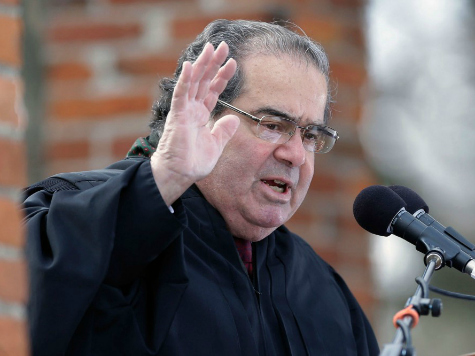Justice Antonin Scalia concurred with the majority on the Supreme Court in the unanimous decision to strike down President Barack Obama’s “recess” appointments to the National Labor Relations Board in NLRB v. Noel Canning. However, he wrote that the majority’s interpretation, which still allows the president to make recess appointments when the Senate is not yet between sessions, departs from the original text of the Constitution.
Last January, the U.S. Court of Appeals for the D.C. Circuit voided Obama’s appointments because they had been made when the Senate was holding pro forma sessions and had not declared itself in recess. Later in the year, the Third Circuit agreed. Only recess appointments made during Congress’s year-end adjournment–“the Recess“–were constitutional (and then, the D.C. Circuit said, only for vacancies arising during the recess).
The Supreme Court majority in NLRB v. Noel Canning dialed back that holding, and allowed “intra-session” as well as year-end “inter-session” recess appointments, provided that the recess had been longer than ten days. It interpreted the constitutional phrase “the Recess” to include both kinds, and pointed out that “the Senate has never taken any formal action to deny the validity of intra-session recess appointments.”
Scalia and three other justices–Roberts, Thomas, and Alito–rejected this use of historical practice to justify departing from the plain language of the constitution. The majority, Scalia wrote, was relying on an “adverse-possession theory of executive authority”–referring to a doctrine in property law under which property may change hands if the owner does not actively protest another person’s possession for a lengthy period of time.
Though the Court might consider historical practice as a guide to interpreting unclear phrases in the text of the Constitution, Scalia wrote, the phrase “the Recess” was simple and clear. And even if Congress had agreed to accept past intra-session recess appointments, he added, the Constitution could not be amended by mutual agreement of the two branches. Allowing such amendments would diminish the Court’s power, he warned.
Scalia reminded the majority that it was up to the judicial branch, not the other branches, “to say what the law is,” and that accepting the Court’s arbitrary 10-day rule, rather than the constitution’s plain meaning, would mean diminishing the ability of the Court to patrol executive overreach. How would future controversies over the 10-day rule be resolved? he asked. “The majority does not say, and neither does the Constitution.”

COMMENTS
Please let us know if you're having issues with commenting.